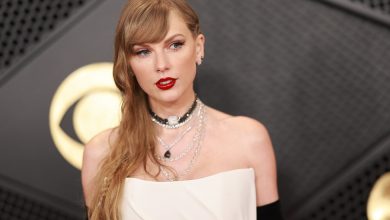Vladimir Potanin, Russian Oligarch, Steps Down as Guggenheim Trustee

For 20 years, Vladimir O. Potanin, one of Russia’s richest men, has been a key supporter of the Guggenheim Museum, serving as a trustee and major benefactor while his foundation sponsored exhibitions, including the current show in New York about the Russian artist Wassily Kandinsky.
But the museum said on Wednesday that Mr. Potanin was stepping down as one of its trustees, a position he has held since 2002. It gave no reason for the decision, but the museum’s statement referenced the war in Ukraine, and Mr. Potanin has been closely associated with President Vladimir V. Putin of Russia.
“Vladimir Potanin has advised the Board of Trustees of his decision to step down as Trustee effective immediately,” the Guggenheim said in a statement. “The Guggenheim accepts this decision and thanks Mr. Potanin for his service to the Museum and his support of exhibition, conservation and educational programs. The Guggenheim strongly condemns the Russian invasion and unprovoked war against the government and people of Ukraine.”
Mr. Potanin is the latest in a line of Russian artists and donors whose stances on the war and positions in the cultural world have been challenged as outrage over the Russian invasion grows.
On Tuesday, Petr Aven, another prominent Russian businessman, stepped down as a trustee at the Royal Academy of Arts in London, which said it was returning his donation toward a current exhibition, “Francis Bacon: Man and Beast.” Mr. Aven had recently come under sanctions from the European Union, which described him as “one of Vladimir Putin’s closest oligarchs.”
Others in the arts world who have been affected by reaction to the war include Valery Gergiev, the Russian maestro and prominent supporter of Mr. Putin, who was removed this week from his post as chief conductor of the Munich Philharmonic after he refused to denounce Mr. Putin’s invasion of Ukraine.
In London, the Tate has faced questions about its connections to another prominent Russian oligarch, Viktor Vekselberg, who is listed as an honorary member of the Tate in recognition of donations he made from 2013 to 2015. He and his company have been under U.S. sanctions since 2018.
Mr. Potanin has also given millions of dollars to the Kennedy Center in Washington, where his name is inscribed on a wall. The center used some of the money Mr. Potanin donated to install a meeting space known as the “Russian Lounge,” which was created and designed by notable Russian artists and featured artworks from Valery Koshlyakov.
“This is a complicated issue, and we are actively assessing the best way to address it in the short and long terms,” Brendan Padgett, a spokesman for the Kennedy Center, said of its association with Mr. Potanin.
At the Guggenheim, Mr. Potanin had also endowed a named conservation fellowship in 2019. The museum said it now “no longer has a named Potanin Conservation Fellowship,” without elaborating.
Mr. Potanin’s relationship with the museum took on a high profile in 2005 when his foundation helped finance an 800-year survey of Russian art, from icons to 19th-century paintings, called simply “Russia!” at the Guggenheim. Mr. Putin spoke at the opening in New York.
Mr. Potanin, a billionaire who made his fortune in banking and natural resources, including a major stake in one of the world’s largest nickel producers, has never had sanctions imposed against him. But as with many of the rich men who have made their fortunes during the past few decades and kept them as Mr. Putin has ruled Russia, he is closely associated with the Russian president. He was among a group of leading oligarchs who met with Mr. Putin in the Kremlin last week, days after the Russian invasion of Ukraine. He has not commented on Russia’s actions in Ukraine.
A representative of Mr. Potanin’s foundation did not immediately return a request for comment.
In the past two decades, Russian money has provided a large boost to arts organizations in the West, where Russian philanthropists have often used art to promote a positive image of their homeland.
Russia-Ukraine War: Key Things to Know
A city is captured. Russian troops gained control of Kherson, the first Ukrainian city to be overcome during the war. The overtaking of Kherson is significant as it allows the Russians to control more of Ukraine’s southern coastline and to push west toward the city of Odessa.
Military aid. Several countries are funneling arms into Ukraine, while NATO is moving military equipment and troops into member states bordering Russia and Belarus, amid rising fears that Russia might try to reclaim its sphere of influence in Eastern Europe.
American airspace ban. President Biden announced that the U.S. will ban Russian aircraft from flying through American airspace. The ban follows similar moves by the E.U. and Canada to shut airspace to passenger flights from Russia and to planes used by Russian oligarchs.
Russian convoy. Satellite images show a Russian military convoy stretching 40 miles long on a roadway north of Kyiv, with a number of homes and buildings seen burning nearby. Experts fear the convoy could be used to encircle and cut off the capital or to launch a full-on assault.
In his support for the Kennedy Center, Mr. Potanin’s foundation has given $450,000 to underwrite Russian programming, with the last donation coming in 2016, the center said. His company Interros gave $6.45 million in 2011, including $1.45 million for the Russian Lounge.
The latest moves at the Guggenheim and the Royal Academy underscore the questions now faced by cultural institutions, and their benefactors, as they come to terms with the fallout from the war in Ukraine.
“It’s complicated,” said John MacIntosh, managing partner of SeaChange Capital Partners, an organization that supports nonprofits. He said nonprofits could not be expected to always fully vet, “from square one, everybody that they take donations from. But they have to recognize that it does create a connection and that they are providing implicitly at least some kind of imprimatur on the donor.”
Mr. MacIntosh recalled that similar questions had arisen over money given to cultural institutions by the Sackler family, whose donations, once welcomed, were later met with growing unease in the art world because of the link between the family’s pharmaceutical interests and the opioid crisis.
“There are times when we have to reflect on the connections that we have and sometimes part company with people who have been supportive,” Mr. MacIntosh said.



